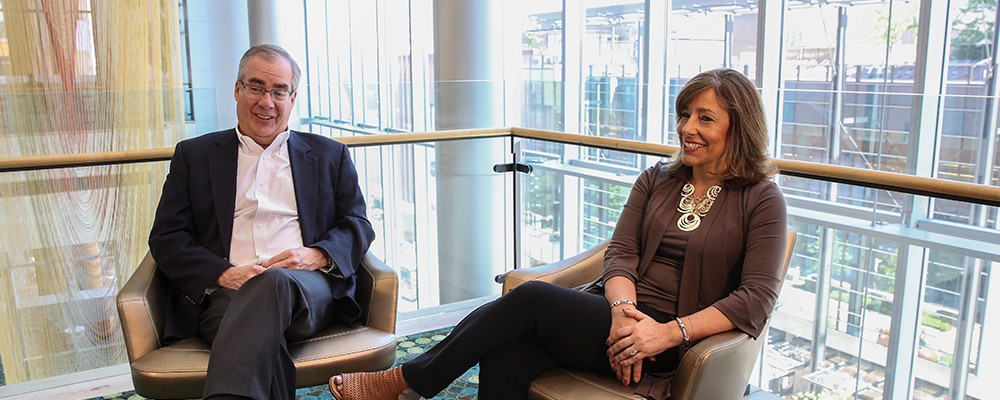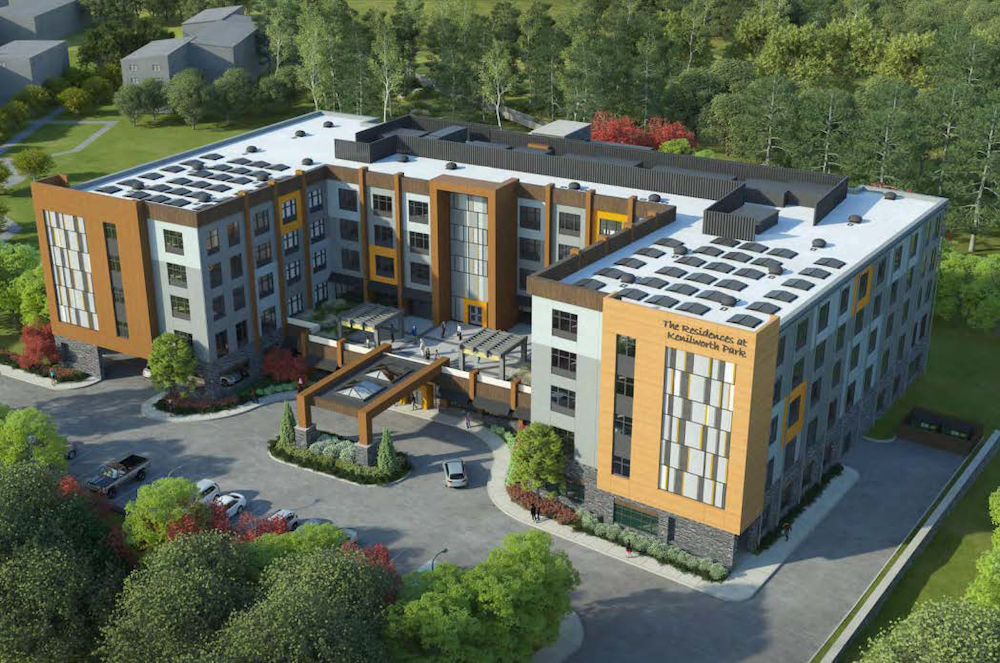In the last four years, the leaders of Northbridge Companies expanded their focus, including through a new joint venture to serve the middle market.
And while the company has experienced challenges related to Covid-19, Northbridge also executed on nearly $300 million in transactions during the pandemic.
Now, CEO Jim Coughlin and President Wendy Nowokunski are vigilant about ongoing challenges — particularly related to workforce — but optimistic about the pace of recovery across the Northbridge platform. Two communities are 100% occupied, memory care occupancy is in the 90% range, and the portfolio overall is in the high 80% range, Coughlin told Senior Housing News.
He and Nowokunski remain committed to the strategy that has served them well since co-founding the company.
That strategy hinges on the close management of a regional portfolio and a diversified but vertically integrated business, including a development company, management company and advisory arm. Coughlin and Nowokunski are also personally invested in their properties, alongside a group of high-net worth families and other financial partners.
The portfolio includes 19 Northbridge communities and six under the new venture, dubbed Hallbridge Partners — a combination of the Northbridge name and that of its partner, HallKeen. There are also two developments in progress, including an innovative project focused on more affordable assisted living, located in the Washington, D.C. market.
Middle-market innovation
Nowokunski and Coughlin are industry pioneers; she was one of the founding partners of Benchmark, while he was one of the early leaders of Newton Senior Living, which eventually sold to Atria.
Since joining forces about two decades ago, they have built Northbridge into a strong regional presence throughout the Northeast, with communities in Connecticut, Maine, Massachusetts and New Hampshire, providing independent living, assisted living and memory care.
In considering where to lead the company next, the middle market came into focus.
“This affordable agenda that we have is really looking towards the future, and how do we fill out the needs that seniors are going to have here in the coming years,” Nowokunski told SHN. “We’re right on the brink — 2025 is going to be an explosion of seniors, and it’s not just going to be those seniors that can afford [market-rate senior housing], it’s going to be everybody … so how are we going to be able to serve that entire group?”
In creating a 50/50 partnership with HallKeen, Northbridge tied up with one of the largest developers of affordable senior housing on the East Coast. HallKeen has about 10,000 owned and operated units, Coughlin noted, with deep experience in layering low-income housing tax credits (LIHTCs) and other types of subsidies.
Of particular note is a project that HallBridge is undertaking with development firm Gragg Cardona Partners in the District of Columbia, dubbed The Residences at Kenilworth Park (see rendering above). The 157-unit building is being financed in part through $58 million in bonds and $20 million in 4% LIHTCs, issued by the D.C. Housing Finance Agency.
Through a pilot project with a Medicaid waiver program, the community will offer assisted living at a middle-market price point, Nowokunski said.
Providers such as Gardant have achieved success with Medicaid-supported assisted living in select states, such as Illinois. Nowokunski and Coughlin are hopeful that Massachusetts will also adopt a similar program, and are actively discussing options with state officials.
While apartment-style affordable housing for largely independent residents is relatively common, providing more robust health care is difficult at this price point. Tapping Medicaid dollars is one potential solution, but the operational model is still difficult.
Utilizing universal workers is one way to keep labor costs more manageable, Nowokunski said, while avoiding expensive debt and equity is also a must.
“We’re getting to that point where it’s a nickels-and-dimes business, so every aspect of the operating model has to be very, very efficient,” she said.
Affordability also has to be supported by smart decisions related to site selection and building design, but that does not mean that physical plants have to be unappealing or bare-bones. The Residences at Kenilworth Park is slated to include a variety of amenities, including a general store, fitness/wellness center, hair salon and green roof.
“It’s a beautiful building,” Nowokunski said.
But, she also sees opportunities to acquire older senior housing stock and reposition the properties for a lower price point. But she and Coughlin emphasize that now is the time to be advocating for needed policies and resources, such as Medicaid and infrastructure funds.
“Now’s the time to adopt the appropriate policies, because it’ll take us 5 to 10 years to build the housing stock that is necessary to support the need,” Coughlin said.
Growth during Covid
Based on their experience with other companies, Coughlin and Nowokunski have targeted 20 to 25 communities as the ideal size for Northbridge.
“It seemed like 20 to 25, at that point, it was manageable without having to then go to another level in the management company and invest in all of that,” Nowokunski said. “And 20 to 25 was good, to be able to have your hands on what you’re doing and making sure that the quality is there, and that your mission is living in all of your communities.”
The platform is just about at that scale now, with 10 communities added in the midst of the pandemic. The dislocations caused by Covid-19 created some opportunities to acquire communities at attractive price points, and Northbridge executed a portfolio deal with real estate investment trust Welltower (NYSE: WELL) to buy back six properties.
The REIT had acquired those buildings about four years ago. Welltower and Northbridge had “vision of potentially growing together,” but their alignment shifted over time, and the 6-property transaction was seen as mutually beneficial, Coughlin said.

“We were very fortunate that we were able to raise capital in the middle of Covid and attract close to $200 million of capital into the space,” he said. “And [the deal] achieved Welltower’s goals and achieved our goals. Welltower … continues to be supportive of us, and we have a good working relationship with them.”
The Northbridge portfolio also is growing through development. This month, an 87-unit community broke ground in Marblehead, Massachusetts.
That project took 4.5 years to permit and also had to contend with recent escalations in construction costs and other headwinds — not to mention capital market disruption due to Covid-19.
Northbridge is also working on a memory care project in Milton, Massachusetts, on land adjacent to Beth Israel Hospital.
“We continue to focus on high barrier-to-entry markets,” Coughlin said. “Others may not have the ability to have a long, drawn-out permitting process, but it seems to work for us.”
Addressing workforce challenges
While bullish on the company’s growth trajectory and strategy, Coughlin and Nowokunski are also vigilant about ongoing challenges — with labor being high on the list.
With worker shortages and rising wages creating pressure across senior living — and other industries — Northbridge brings its hands-on management approach to bear.
For instance, even before the pandemic, Coughlin and Nowokunski conducted “Listen and Learn” sessions, in which they would speak directly with frontline staff. Based on that feedback, they would create a list of action items and choose five that could be addressed immediately, to demonstrate “instant action” to the workforce.
“Our associates are now advocating — we want you coming back, because we need to be heard again,” Coughlin said. “That shows the ownership in their community and their engagement.”
Northbridge is also taking a big-picture approach to workforce development. That effort includes educating the marketplace on career opportunities, and the unique and rewarding aspects of working in senior living. Interfacing with high schools, colleges and social organizations has “worked well” for Northbridge, Nowokunski said.
During the pandemic, she and Coughlin also started a nonprofit called The Compassionate Caregivers fund. The goal was to create a mechanism for assisting team members with individual challenges and episodic events, from child care to car repairs. Northbridge associates, investors and other individuals and organizations can contribute into the fund.
“That really was a game-changer for us,” Coughlin said. “We had great retention, and … those teams have stayed intact.”
In terms of pay, Northbridge’s average certified nursing assistant (CNA) wage is about $17 an hour. Paying at the highest rates for frontline workers is a goal for the company, but margin compression makes wage hikes increasingly difficult.
Assisted living margins have eroded from around 35% to 25% or lower — some communities are even in the teens, Nowokunski said. With monthly rates already in the $8,000 to $10,000 range in some locations, charging residents materially more is not feasible.
It’s a dilemma that other senior living executives, including Senior Living Communities CEO Donald Thompson, have recently described.
For Nowokunski and Coughlin, the solution is multi-faceted.
Creating a positive work environment is critical, as national surveys generally indicate that poor management — not low wages — is the primary cause of turnover. And supporting a balanced lifestyle through flexible scheduling is also important, Nowokunski said.
But public policy action is also imperative in order to create a stable senior living workforce, she and Coughlin said. Immigration reform is high on their list of priorities.
“Public policy-wise, we’re not going to survive unless we have that,” Nowokunski said. “There’s just not enough people that are in the U.S. that are going to want the types of jobs that we offer.”
Policies that support education and career advancement are also important, they emphasized.
One silver lining of the pandemic is that caregivers are being recognized and celebrated for their work, and senior living providers now have to seize the moment to push for needed workforce policies, Coughlin said.
“It’s our job as advocates to … get that support and get it as an industry, so that we can move in a positive direction and then address the million and a half caregivers that we do need in the next five years,” Coughlin said. “It’s up to us to get the momentum behind it.”
Companies featured in this article:
HallBridge Partners, HallKeen, Northbridge Companies, Welltower


